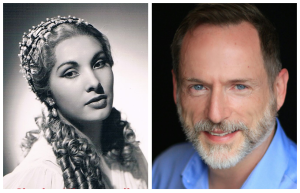Podcast: Play in new window | Download (Duration: 1:51:54 — 109.0MB) | Embed
Subscribe: Spotify | TuneIn | RSS | More
Today’s episode is one of my Listeners’ Favorites episodes, this one introduced by my wonderful friend Thom Baker. He had just written me about his enthusiasm for the Rosanna Carteri episode I posted in the fall of 2020 on the occasion of her death, just a few short weeks before her 90th birthday. Thom and I were both equally taken with this long-lived artist, who abandoned her performing career in 1966 when she was only 35 years old, brought her full-throated voice and impeccable artistry to operatic stages around the world for fifteen exceptional years. Carteri’s was a lyric yet full-bodied voice with facility that allowed her to undertake soubrette parts as well as some spinto roles. I feature extended examples of her versatility over the course of that entire career, including excerpts from La traviata, La bohème, La rondine, Guglielmo Tell, Falstaff, L’elisir d’amore, Madama Butterfly, Roméo et Juliette, Otello, Pietro Mascagni’s L’amico Fritz and Iris, Prokofiev’s War and Peace (the final version of which she created in Florence in 1954), the premiere recording of Poulenc’s Gloria and Gilbert Bécaud’s Opéra d’Aran (which she premiered in Paris in 1962). These operas represent just a fraction of her repertoire, in which are featured, among others, Giuseppe di Stefano, Nicolai Gedda, Leonard Warren, Carlo Bergonzi, Ettore Bastianini, Ferruccio Tagliavini, Giuseppe Taddei, Cesare Valletti, and Giuseppe Gismondo and conductors Tullio Serafin, Pierre Monteux, Vittorio Gui, Georges Prêtre, Gabriele Santini, and Artur Rodzinski. In other words, the crème de la crème of the operatic firmament in the 1950s and 1960s, in which company Carteri most emphatically belonged.
Countermelody is a podcast devoted to the glory and the power of the human voice raised in song. Singer and vocal aficionado Daniel Gundlach explores great singers of the past and present focusing in particular on those who are less well-remembered today than they should be. Daniel’s lifetime in music as a professional countertenor, pianist, vocal coach, voice teacher, and journalist yields an exciting array of anecdotes, impressions, and “inside stories.” At Countermelody’s core is the celebration of great singers of all stripes, their instruments, and the connection they make to the words they sing. By clicking on the following link (https://linktr.ee/CountermelodyPodcast) you can find the dedicated Countermelody website which contains additional content including artist photos and episode setlists. The link will also take you to Countermelody’s Patreon page, where you can pledge your monthly support at whatever level you can afford.

